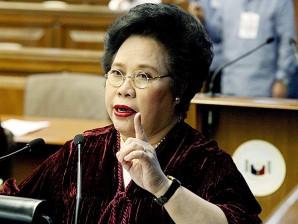Senator Miriam Defensor-Santiago is “flattered” at having been nominated for the position of Chief Justice.
But the 68-year-old former trial court judge is under no illusion that she would be chosen, mainly because she voted to acquit ousted Chief Justice Renato Corona at the Senate impeachment trial.
“President Aquino will not appoint me because I am in the doghouse,” she said in a phone interview.
“I voted for acquittal. I have zero prospect for appointment even if I am included in the JBC (Judicial and Bar Council) Top 3 (list),” she said.
Santiago and Senators Joker Arroyo and Ferdinand Marcos Jr. were the only three to vote for Corona’s acquittal, a position opposed to the desires of Malacañang.
The President had openly campaigned for Corona’s removal and got his wish when 20 senators voted to remove Corona for failing to disclose all his dollar and peso deposits in his statements of assets, liabilities and net worth (SALN).
But more than her impeachment vote, Santiago said she could not accept the nomination because she has been elected to sit as a justice in the International Criminal Court in The Hague.
No-brainer
“That’s a no-brainer. I have no choice. I have to comply with my obligation because I was elected after a formal campaign led by the Philippine mission in New York. Naturally, the person who consents to be nominated for the ICC, in effect, makes a promise that she will serve if elected,” she said.
“I cannot possibly accept the Supreme Court nomination, although I am flattered,” she said.
Santiago also cited the unimpressive compensation of a chief justice and the “passive” nature of the judiciary as precluding her accepting the post if offered.
“Basically, the role of the justices is passive. You wait for a case. We are silenced in effect by becoming justices, so it’s not a role that I would relish,” she said.
“The good part, as far as my political enemies are concerned, is if I become Chief Justice or even just justice of the Supreme Court, that would effectively render me deaf and dumb,” she said.
Santiago said joining the judiciary would also mean that she would have to “take a vow of poverty.” She said the income of a chief justice paled in comparison with that of a senator.
Santiago was nominated to the highest judicial post by lawyer Victor del Rosario.
Santiago’s Senate colleague and law school classmate, Senator Franklin Drilon, was also nominated, but Drilon could not be reached for comment as of Wednesday. Drilon earlier said he was not interested in replacing Corona.
Santiago said she would prefer that Mr. Aquino appoint a female Chief Justice, a first in the country’s history, but not from among the incumbent female justices.
Mr. Aquino’s first appointee to the high tribunal is Justice Maria Lourdes Sereno. Last December, some two weeks after Corona was impeached, the Palace said the President preferred a new Chief Justice in the mold of Sereno.
“I’m afraid that they have been lobbying already, that’s why I’m suspicious about them. They might have been pulling political strings and so on, so I would go for an outsider,” she said.
Santiago also expressed reservations over the large number of lawyers nominated. The number of nominees has ballooned to more than 60 as of Tuesday.
“Overweening ambition has become the prevailing discipline in the minds of lawyers,” said Santiago of the seeming mad rush for the top judicial post.
“You don’t consider anymore whether you have sufficient experience, background, or performance, much less achievement. They all just want to be Chief Justice,” she said.
Santiago also questioned the relevance of the Judicial and Bar Council, the constitutional body tasked to screen applications for judicial posts.
“I think that in the next Constitution, we should abolish the Judicial and Bar Council,” she said, adding that should there be a revision of the Constitution, the JBC’s job could be delegated to the Senate.
She said the creation of the JBC was meant to abolish politics in the selection process.
“As it turns out now, it has become a political body. There’s also politics being played out there. So it defeats the purpose for which it was created,” she said.
